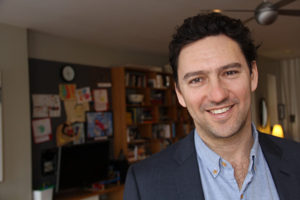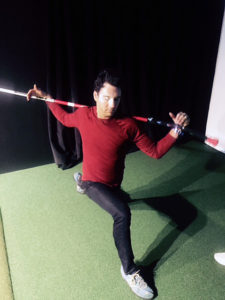
“Golf is tremendous as a lived-experiment in the nature of resilience,” Kahn says.
Jonathon S. Kahn is a professor of religion at Vassar whose teaching and writing are focused on the intersection of race, religious ethics, and politics. A regular at The Bridge Golf Learning Center, Kahn recently fielded some questions from Executive Director and Co-Founder Farrell Evans.
FE: You have a great golf pedigree. Your dad played college golf at Duke and is still an excellent player. You’re a single-digit player who had a stint on the Princeton golf team. What does it mean to be able to hit golf balls year-round in your neighborhood in Harlem?
JK: Well, one thing it means is that I have at least an outside shot of keeping up with my father, who’s 75 and regularly shoots below his age. But, the best part of being able to hit balls in Harlem is walking into the Center in the afternoon and being able to talk golf with young people, knowing that they are being introduced to the challenges and splendors of the game.
FE: At Vassar College, you are a religion professor. Much of your work has centered around ethics. What do ethics have to do with golf?
JK: To be sure, there’s a strong part of the game about situational ethics — delineating right from wrong in terms of honesty. And that’s important. But there’s this other part of the game that I also think of as ethical, in the sense of moral development. And that has to do with the difficulty of the game. The game is tremendously hard, and to really devote oneself to it is to necessarily confront one’s limitations and the need to persistently struggle and strive. What are the ethics of persistence? Golf is tremendous as a lived-experiment in the nature of resilience.
FE: What’s the best ethics lesson that you have ever seen play out in a golf tournament?
JK: Again, I like to think of ethics a bit expansively. For me growing up, the best ethics lesson was seeing Calvin Peete on the PGA Tour. That homemade swing and the crooked arm were about defying the norms of country club golf. I just loved to see him compete and insist on his place of excellence in the game.

Kahn stretched before a recent lesson with Teaching Professional Brian Hwang at The Bridge Golf Learning Center in Harlem.
FE: You take lessons with Brian Hwang, one of our teaching professionals. What are you working on?
JK: Brian is just great, such enormous love for the game. We’re working on keeping my right side moving through the ball. I have a tendency to stay back and flip-it or block it. He’ll get me there.
FE: As a member of our advisory committee, you’re deeply invested in the success of our mission. You’re also raising a young man of color. Why is the work of the Foundation so vital to the broader society?
JK: The game is a game of character. It requires character to play well and correctly. That means, as I mentioned, knowing how to deal with bad shots. It means knowing how to be social and respectful. The game is also generational. One of the unique parts of the game is that you can have a foursome made up of four different generations. Contexts like this are rare in today’s America. Societally, we lack contexts where different people come together in unrushed ways and learn about and from each other. I think golf holds this potential. The young men in The Bridge Golf Foundation, to be sure, are learning the game and working on their studies. But at some point I also think they will realize that they ultimately have abilities that are deeply needed by our society.
FE: When the Center opened, you were skeptical about hitting golf balls indoors. How has your attitude around this evolved over time?
JK: Yeah, that’s true. I didn’t think it could possibly be realistic enough. And I still love hitting balls outdoors and taking a divot! But I’ve come around. With Brian’s help, it’s possible to isolate some key numbers that explain very clearly why the ball does what it does.
FE: What philosopher would you tell Tiger Woods to read during his comeback?
JK: That’s a great question. There’s this wonderful book by Jonathan Lear called “Happiness, Death and the Remainder of Life.” Lear argues that all of us have a tendency for self-sabotage as we toggle between our desire for happiness and the fear of death. The remainder of life is what happens when we acknowledge those self-destructive tendencies. It seems like Tiger might be a tad familiar with these impulses. Tiger is now in the “remainder” of his career, when he no longer can be what he was. How well he honestly deals with who he is now — after everything — might be key to his future flourishing.